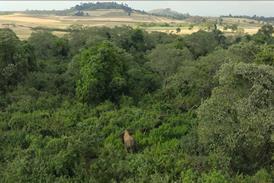 Sponsored content
Sponsored content
The government insurance scheme will be great for confidence in uncertain times and shows the industry is open for business, says Charlotte Sanders
With the majority of productions forced to shut down throughout lockdown, the foremost concerns for content creators were not only when filming could restart, but how to do so safely and profitably should Covid-19 impact them.
Once filming started up again in July, a difficult choice had to be made on whether the production could restart adhering to social-distancing measures: a decision that soaps such as EastEnders and Coronation Street chose to take on. However, many producers decided they could not resume filming immediately.
Adding to the pressure that these productions were facing, insurers have not been covering against the risk of Covid-19, which prevents producers from securing financing.
The government has announced a host of measures to boost culture and arts within the UK, including the £500m Film and TV Production Restart Scheme, which was launched by culture secretary Oliver Dowden and chancellor Rishi Sunak at the end of July to “jumpstart” the UK’s creative industries.
This money is reserved for production companies who are unable to secure insurance for Covid-related costs and seeks to plug the gap left by available insurance. These costs range across cast/crew illness, filming delays or disruptions caused by the virus.
It is important to note that this scheme is only temporary, supporting productions that begin filming before the end of the calendar year and for Covid-related losses until the end of June 2021, with future claims allowed to be backdated to 28 July 2020.
The industry is, however, lobbying for the scheme to be extended to cover shows that resume filming in 2021, such as high-end drama projects.
Furthermore, the scheme will focus on costs incurred by a delay or abandonment of a physical shoot, rather than development or post-production work. The scheme assumes that this type of work can still continue under any future potential lockdown.
There are a few key points that production companies should be aware of before entering into the scheme.
The scheme is available to any producer or co-producer (an ‘eligible participant’) that is either a company resident in the UK or partnership whose profits are subject to tax in the UK. This eligible participant must complete a registration process for the eligible production between the launch date (yet to be announced) and 31 December.
The registration form will detail the production and how it satisfies the eligibility criteria meeting both a cultural test and a commercial viability test (that the participant is not able to obtain insurance cover for Covid-19 and has obtained insurance to cover other aspects of the production).
The fee for participating in the scheme will be 1% of the production budget or 1% of the aggregate value of the financial interests of each co-producer who is eligible to participate in the scheme.
Half the production budget must be spent in the UK, only 20% of the production budget can be compensated due to Covid-19 delays and 70% of the budget will be covered if the government agrees that abandonment was the only necessary action. A cap of £5m worth of claims per production is in place and a claim form must be submitted to request compensation.
The commencement of the scheme is conditional upon the European Commission providing state aid approval and while draft scheme rules have been published, these are subject to change. Please refer to the DCMS website for the latest information.
The impact on indies
As more details on the scheme are being released, what does this really mean for the sector? Essentially, the scheme is plugging a gap that was preventing a large number of production companies from securing funding.
According to BFI chief executive Ben Roberts, the issue of securing coronavirus-related insurance “quickly emerged as the biggest hurdle for independent producers” when coronavirus made its way to the UK.
This scheme is good news for production companies, jobs and the UK economy to which this industry contributes £12bn per annum – though it should be noted several indies are concerned about the length of time it is taking for the scheme to open to applications.
On an individual level, workers in the sector are no longer expected to take periods of unpaid leave if the production has to be delayed due to Covid-19. The pandemic cut off many of these workers’ incomes overnight and this scheme provides a level of stability that we have not seen during the last five months.
This is a great confidence boost for the sector in such uncertain times. Now that we are assured that productions can access the necessary insurance they need, we at Barclays have started to provide production finance again.

We are fully supportive of the production sector getting back to work and are looking to support these companies where we can.
- Charlotte Sanders is a relationship manager at Barclays’ Technology, Media and Telecoms team. You can read more about the scheme here





























